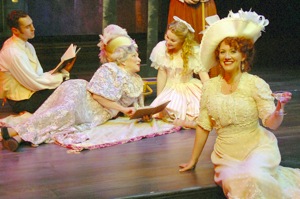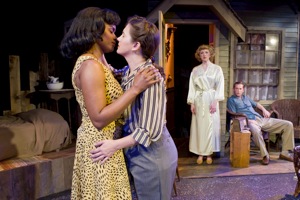-
- Author emerges as public face for the transgender community
- Lesbian priest wants license to minister in ND
- ACLU demands H&R Block allow civil union couples to file online
- Gay student’s slaying sparks outcry, demands for programs
- Social worker says he will oppose Sally Kern in fall elections
- Sex education skit raises concerns
- National News Briefs
- World News Briefs
Theater
Prejudice, bed-swapping, murder and surviving widowhood
Published Thursday, 03-Apr-2008 in issue 1058
‘A Little Night Music’
A Little Night Music, Stephen Sondheim’s paean to marriage and other, less permanent liaisons, is on the boards as Cygnet Theatre Company’s shakedown cruise in its newly acquired second space, the Old Town Theatre. Extended through May 11, A Little Night Music is directed by Sean Murray, who also stars as Fredrik Egerman.
Set in Sweden at the turn of the 19th century and inspired by the 1955 Ingmar Bergman film Smiles of a Summer Night, A Little Night Music is a sex farce gone semi-serious. It sports one of those European weekend-in-the-country plots where characters eat, drink and either change beds, gossip about it or lament someone else doing it.
The Bergman script notes that summer nights smile on three groups – the young, the fools and a third catch-all category including the sad, the hopeless, the confused and the deceived. This weekend offers some of each, along with a score in three-quarter time and a Greek chorus to comment.
Fredrik (Murray), bored with his much-younger wife, longs to reconnect with actress and former mistress Desirée Armfeldt (Marci Anne Wuebben), who has a liaison with Count Malcolm (Randall Dodge), whose wife Charlotte (Sandy Campbell) plots to get even. Meanwhile, Fredrik’s college age son Henrik (Sean Cox) is having a fling with lusty maid Petra (Melissa Fernandes) while pining for his young stepmother Anne (Courtney Evans).
So much for the fools. The old and confused are represented by Sandra Ellis-Troy, in a lovely turn as Madame Armfeldt (and Desirée’s mother) and her granddaughter Fredrika (Nicki Elledge). Ellis-Troy’s world-weary delivery delights, and she absolutely shines in her signature song “Liaisons” (“The king of the Belgians, when things got touchy, deeded me a duchy”).
I confess to a bias in favor of music with melodies the average theatergoer could hum, so for me the star of this show is not the much-lauded Tony-winning score, which features many clever lyrics but nary a tune and seems to consist primarily of a race to cram as many syllables as possible into a bar of music. While the value of such an exercise escapes me, the legions of Sondheim fans who find it charming will not be disappointed.
Sondheim’s best known song, “Send in the Clowns,” a meditation on being spurned, is nicely handled by Wuebben. Fernandes’ lusty ode to making the best of what you’ve got, “The Miller’s Son,” and Campbell’s sad comment on her philandering husband, “Every Day a Little Death,” are other standouts.
But for my money, Jeanne Reith’s fabulous costumes and the overall competence of the large singing cast are the stars of this show. Especially welcome are Wuebben and Dodge, fine singing actors and staples in North County theaters but seldom seen much south of state route 78.
Bravo to Murray and Cygnet for pulling off this tricky show and making it sound good even without a pit orchestra.
The Old Town Theatre will close for renovations after this show and reopen in the fall.
Many San Diegans feel the state made a huge mistake when it turned the Bazaar del Mundo concession over to out-of-state interests, and closing the theater didn’t help. Cygnet should help re-establish Old Town as a place for locals to come.
Cygnet Theatre Company’s production of A Little Night Music plays through May 11 at Old Town Theatre. Shows Thursday through Saturday at 8 p.m.; Sunday at 2 and 7 p.m. For tickets call (619) 337-1525 or visit www.cygnettheatre.com.
‘Bluebonnet Court’
Homophobia, racism, anti-Semitism and PTSD are just a few of the themes in Zsa Zsa Gershick’s award-winning Bluebonnet Court, at Diversionary Theatre through April 13, in co-production with MOXIE Theatre. MOXIE’s Delicia Turner Sonnenberg directs.
It’s 1944 and New York journalist Helen Burke (Wendy Waddell) is stuck in Austin, Texas after plowing into a tree in order to avoid a deer in the road. In Texas to write one last war story for the New York Daily News before fleeing to Hollywood for an MGM screenwriting job, Helen is at the mercy of local mechanics who do not share her urgency, but work on the “things take the time they take” principle.
Helen checks into Bluebonnet Court, presided over by Lila Jean (Jo Anne Glover) and her recently returned soldier husband, Roy Glenn Webb (Christopher Buess). Roy Glenn suffers what was then called shell shock (now known as PTSD) and drinks to try to stave off nightmares about the death of fellow soldier (and Lila Jean’s twin) Robert.
Lila Jean runs the place with the help of black maid Orla Mae Bird (Monique Gaffney), a self-educated voracious reader and the target of Roy Glenn’s racist comments, as his anti-Semitic remarks are aimed at Helen. Orla Mae knows her place in this house but Helen knows a kindred soul when she meets one, and soon Roy will have another reason to disparage both.
Helen and Roy share a fondness for the sauce – she has brought her own stash of scotch and cigarettes – and it will be to her that Roy confesses the devastation wrought on his soul by the war experience.
Comic relief is provided by “librarian” Nanalu Branch (a hilarious Leigh Scarritt), who has undertaken the task of providing personal comfort for Austin’s returned (or departing) boys in uniform (“This kitten is gettin’ too old for what’s bein’ asked of her,” she gasps). Nanalu is a great character, though I must point out that after 42 years in the profession I have never met a librarian even remotely like her.
Gershick won the 2007 GLAAD Media Award (Gay & Lesbian Alliance Against Defamation) for outstanding Los Angeles theater and two NAACP awards for excellence for Bluebonnet Court. But despite the many changes that have occurred since the ’40s, Gershick has pointed out that “Major media outlets didn’t cover the GLADD award. But the Army did.”
Kudos to Sonnenberg and Diversionary’s Bret Young for their fine adaptation of Joel Daavid’s original set design, and to Jennifer Brawn Gittings for her evocative period costumes. The flavor of the ’40s is further imparted by occasional radio spots – food ads, a revivalist selling God, a typical musical show, all performed splendidly by Lisel Gorell-Getz and Fred Harlow.
Gershick’s script and Sonnenberg’s top-notch cast make this a compelling theater piece artfully combining major social issues, a sweet lesbian romance and dialogue that amuses while it makes its points. That’s a winning combination.
Bluebonnet Court runs through April 13. Shows Thursday at 7:30 p.m., Friday & Saturday at 8 p.m., Sunday at 2 and 7 p.m., and Monday, March 31 at 7:30 p.m. For tickets call (619) 220-0097 or visit www.diversionary.org or www.moxietheatre.com
‘The Cemetery Club’
Three Jewish widows in varying stages of bereavement meet once a month for a visit to their husbands’ graves in Forest Hills, Queens.
The overtly social Lucille (D’Ann Paton), sporting a new fur coat, is the least broken up at the demise of her philandering spouse, and uses the visits (and any other opportunity that presents itself) to scout for men.
At the other end of the spectrum is Doris (Marilyn Wolfe), the stereotypical mourning widow, still unwilling to let go and quick to condemn more cavalier attitudes in others. It is she who instigates the cemetery visits.
In the middle is Ida (Joan Westmoreland), quieter but the most ready to move on. When butcher Sam (Paul Bourque) shows interest, she begins to blossom, noting, “For the first time since Murray died, I feel alive!”
Concern for Ida’s new involvement (and for her potential loss to the group) lead Doris and Lucille to engineer an awkward breakup just before driving the three “bridesmaids” to the wedding of a friend getting hitched for the umpteenth time.
Running the gamut from a drunken scene to psychological disclosure to a drink-throwing screamfest, Menchell’s script plays an amusing and authentic portrait of (some) women’s relationships.
And all works out mostly well. One could snark that the script is predictable and the characters stereotypical (which is true), but that won’t keep you from enjoying the play, because there’s nothing pat about these interpretations. Paton shines in the flashy role of Lucille, whose superconfident exterior crumbles to reveal a surprisingly vulnerable interior. The accent of Westmoreland’s Ida is a bit suspect, but she can convey wordless volumes with her face at particularly difficult moments. Wolfe is rock solid as the aggrieved widow and Bourque is fine as the love interest.
The Cemetery Club runs through April 27 at The Broadway Theater in Vista. Shows Thursday through Saturday at 7:30 p.m.; matinees Saturday and Sunday at 2 p.m. For tickets call (760) 806-7905 or visit www.broadwayvista.com.
‘Black Coffee’
The Guinness Book of World Records names Dame Agatha Christie the best-selling fiction writer of all time, with sales of two billion and counting.
The doyenne of the drawing-room mystery also wrote 19 plays. Oddly enough, only the first – Black Coffee – features Christie’s most famous character, detective Hercule Poirot. You remember Poirot, that prissy little Belgian whose name means both “leek” and “wart,” with his heavy French accent, aversion to dust and disorder, and his way of asking seemingly off-the-wall questions that finally expose the killer.
Black Coffee plays through April 13 at Coronado Playhouse, directed by Keith A. Anderson.
Noted scientist Sir Claud Amory (Bud Emerson) calls his guests together to announce that one of them has stolen the formula for an advanced explosive that could kill hundreds of thousands rather than the paltry thousands now possible. Moreover, since Claud has locked the doors and windows from the outside, the thief is in this room.
The theft becomes a murder case when Claud dies suddenly and Poirot (Michael Gardner) and his sidekick Capt. Hastings (Ivan Harrison) are called in to solve the case.
The suspects include Claud’s loquacious sister Caroline (Lizette Kent Allen), niece Barbara (Jessica Seaman), son Richard and his wife Lucia (Steve Murdock, Elizabeth Mander-Wilson), Claud’s secretary Edward Raynor (Terence J. Burke), unexpected guest Dr. Carelli (Nicolás Peters) and of course the butler Tredwell (Timothy Paul Evans).
Originally produced in 1930 as a three-act play, Black Coffee suffers the pitfalls of the first play – too much verbiage (much of it less than fascinating) and too much obvious plotting (how many times do characters need to implicate Dr. Carelli to make us certain he is not the culprit?). The play clocks in at two and a half hours – long by modern standards.
Production values are high, with a handsome, deep set by Rosemary King and smashing period costumes by Angela Wills. The deep set offers spatial luxury not usually seen here, but also presents sound challenges. The actors need to take more than usual care to project, especially when upstage, and most particularly when facing away from the audience. Too many lines disappear into the cavern.
This isn’t vintage Christie, but it’s great to see Poirot back onstage, and Gardner does him justice. Likewise, Harrison provides a fine British foil for the master detective. The rest of the cast ranges from very good to adequate.
Black Coffee plays through April 13 at Coronado Playhouse. Shows Thursday through Saturday at 8 p.m.; Sunday matinee at 2 p.m. For tickets call (619) 435-4856 or visit www.coronadoplayhouse.com.
|
|
Copyright © 2003-2025 Uptown Publications



